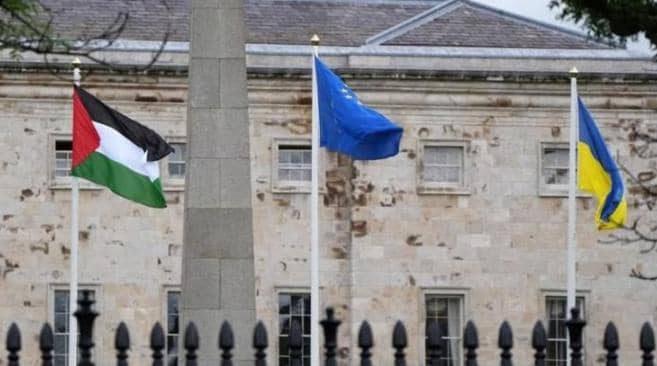Spain, Ireland and Norway have formally recognized a Palestinian state, in what they say is an attempt to refocus attention on efforts to find a political solution to the war in the Middle East.
They hope by acting together they will encourage other European countries to follow suit, in a diplomatic push that could help secure a ceasefire in Gaza and the release of hostages held by Hamas.
The symbolic decision has provoked a furious row with Israel’s government which has accused all three countries of rewarding terrorism.
Israel has withdrawn its ambassadors from Ireland, Norway and Spain and formally reprimanded their envoys in Tel Aviv. All three were summoned to Israel’s foreign ministry last week to be shown footage of the 7 October attacks in front of the media.
The recognition of Palestine by the three countries also increases diplomatic pressure on Israel after two international courts called for an end to Israel Defense Forces (IDF) operations in southern Gaza and accused Prime Minister Benjamin Netanyahu of war crimes.
Western countries have also stepped up sanctions on Israeli settlers in the occupied Palestinian territories.
The process of diplomatic recognition varies between countries, but normally involves a formal exchange of credentials with the Palestinian Authority in Ramallah.
Existing consulates or missions in the West Bank or East Jerusalem then become formal embassies, while representatives transform into full-blown ambassadors.
All three countries said they recognized a Palestinian state based on borders established before the war in 1967, with Jerusalem as the capital of both Israel and Palestine.
The Palestinian flag flew over Ireland’s parliament as TDs set aside four hours to debate the issue. Before the Cabinet where the formal decision would be made, the Taioseach (prime minister) Simon Harris said it was an “historic and important” move.
He said he hoped other European countries would follow the lead because they had to use every lever at their disposal to encourage a ceasefire.
Speaking to parliament as the measure was approved, Mr Harris said: “I hope it sends the Palestinian people a message of hope that in this, their darkest hour, Ireland stands with them.
“It is an expression of our view that Palestine holds and should be able to vindicate the full rights of the state, including self-determination, self-governance, territorial integrity and security, as well as recognizing Palestine’s own obligations under international law.”
As Norway’s formal recognition came into effect, Foreign Minister Espen Barth Eide said it was “a special day for Norway-Palestine relations”.
Ahead of Spain’s cabinet meeting, Prime Minister Pedro Sánchez said recognizing Palestine was “not only a matter of historic justice”, it was also “an essential requirement if we are all to achieve peace”.
He insisted that Spain was not acting against Israel and was standing against Hamas which opposed a two-state solution.
Israel appears most angry with Spain. Its Foreign Minister, Israel Katz, has posted a video on social media showing flamenco dancing and music juxtaposed with explicit images of the 7 October attack, with the words: “Hamas: thank you Spain.”
Spain condemned the post as “scandalous and revolting”. Mr Katz posted similar videos about Ireland and Norway.
The row deepened when Spain’s deputy Prime Minister, Yolanda Díaz, called publicly for Palestinians to be “free from the river to the sea”, a controversial phrase which many Israelis consider antisemitic and a call for the complete destruction of the state of Israel.
In a post on X, formerly Twitter, Mr Katz hit back on Tuesday, comparing Ms Díaz to the Hamas commander, Mohamed Sinwar, and Iran’s Supreme Leader, Ali Khamenei. He told Mr Sánchez that if he did not fire his deputy, “you are participating in the incitement to commit genocide and war crimes against the Jewish people”.
Diplomats suspect that Israel has responded robustly towards Spain, Ireland and Norway to discourage other countries from following their lead.
Slovenia, Malta and Belgium have in recent months indicated they could recognize Palestine too. But Belgium’s government appears to have cooled on the idea ahead of elections.
Prime Minister Alexander De Croo said he wanted to wait until Belgium could recognize Palestine alongside major European nations to have greater impact. “Symbolism solves nothing,” he said.
Most countries – about 139 in all – formally recognize a Palestinian state.
On 10 May, 143 out of 193 members of the United Nations’ general assembly voted in favour of a Palestinian bid for full UN membership, something that is only open to states.
Palestine currently has a kind of enhanced observer status at the UN, which gives it a seat but not a vote in the assembly. It is also recognized by various international organisations including the Arab League and the Organisation of Islamic Co-operation.
A minority of European countries already recognize a Palestinian state. They include former members of the Soviet Bloc, such as Hungary, Poland, Romania, Czechia, Slovakia and Bulgaria, which adopted the position in 1988; and others including Sweden and Cyprus.
But many European countries – and the US – say they will recognize a Palestinian state only as part of a long-term political solution to the conflict in the Middle East.
BBC Report
